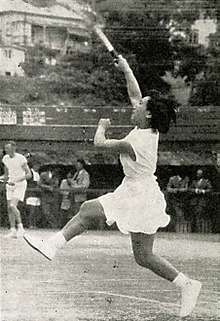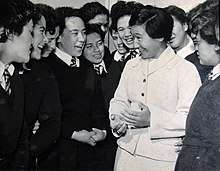Ruia Morrison
Ruia Mereana Morrison-Davy MBE (née Morrison, born 8 May 1936) is a New Zealand tennis player.[1][2] She is Māori, from the Te Arawa and Ngāti Tūwharetoa iwi (tribes).[2] Morrison was the first New Zealand woman and the first Māori person to play at Wimbledon and reached the quarter-finals in 1957. She also won 13 national New Zealand tennis titles.[1]

Early life
Morrison was born in 1936 at Tikitere, a small farming community between Lake Rotoiti and Rotorua in New Zealand's North Island. She was the third of nine children born to Hingawaka (Waki) Morrison and Tanira Kingi.[1]
In 1944, the family moved from Tikitere to live in Te Koutu, Rotorua. Shortly afterwards, Hingawaka Morrison, a rugby and tennis player, built two tennis courts in the community. Morrison, aged 8 years old, wanted to play on the courts but as she was so young her father made her a wooden bat and coached her while she practised on the walls of their house instead.[1]
Morrison attended Rotokawa and Rotorua Primary Schools, Rotorua High School, and Te Puke High School, before moving to Auckland in 1953 where she enrolled at Queen Victoria School for Maori Girls. After finishing high school, Morrison attended Auckland Teachers' College, where she continued to play tennis and also began a long tennis relationship with Heather Robson.[1]
Adult life
Morrison won the national singles title in 1956 and it became clear that for her to make progress in tennis she would need to compete overseas. Hoani Waititi, a prominent educator and tennis umpire, formed a fundraising campaign to help Morrison travel to England to compete at Wimbledon. The campaign was successful, raising more than enough for the trip, and Morrison and Robson left New Zealand in 1957 for England.[1] At Wimbledon, Morrison reached the fourth round, beating Billy Woodgate, J.L. Debford and Sheila Armstrong but losing to American player Betty Pratt, ranked fourth in the world. Pratt invited Morrison, along with the Wimbledon champions Althea Gibson and Maria Bueno, to the Caribbean the following year for international tennis tournaments at Montego Bay, Jamaica, and San Juan, Puerto Rico.[1]
In 1958, Morrison reached the third round of Wimbledon. In 1959, she competed at the British Hard Court championships, losing to Christine Truman in the quarter-finals. She won the Guildford Championships by beating South Africa’s Joan Cross, and the mixed-doubles with Mexican Gustavo Palafox as her partner. The same year, Morrison and Pat Nettleton reached the third round of the ladies' doubles at Wimbledon and Morrison made the fourth round of the mixed-doubles with Brian Woolf from New Zealand. In the Wimbledon singles, Morrison reached the fourth round, losing to the eventual champion, Maria Bueno.[1]
In later years, Morrison won the New Zealand national singles title an additional five times and the national doubles title several times as well. In 1961, Morrison donated the excess money from the 1956 fundraising campaign to the Maori Education Board, rather than travelling to Wimbledon again. Despite not competing internationally that year, she still won the national singles and doubles titles in 1962.[1]
In 1959 and 1960, Morrison entered the W.D. & H.O. Wills tournament in Auckland, winning the women's title in both years; in 1960 she also won the doubles and mixed-doubles. In 1965, Morrison and Elizabeth Terry were selected to travel to Melbourne to compete in the Federation Cup. They beat Argentina but lost to Australia.[1]
Recognition

In the 1960 New Year Honours, Morrison was appointed a Member of the Order of the British Empire, for services in the field of sport, especially tennis.[4] In 2001, Morrison was awarded life membership of the Aotearoa Māori Tennis Association and in 2003 she was inducted into the Māori Sports Hall of Fame.[1] In 2014, she was made a Tennis New Zealand life member.[5]
Legacy
In 2011, Aotearoa Maori Tennis President Dick Garratt began researching Morrison's life in preparation for the publication of a biography, Tikitere to Wimbledon & the World – Ruia Morrison.[6]
References
- Taonga, New Zealand Ministry for Culture and Heritage Te Manatu. "Ruia Morrison". teara.govt.nz. Retrieved 3 March 2018.
- "Ruia Morrison-Davy MBE » māori sports awards". maorisportsawards.co.nz. Retrieved 3 March 2018.
- "Ruia Morrison". Flickr. Retrieved 6 September 2018.
- "No. 41911". The London Gazette (3rd supplement). 1 January 1960. p. 43.
- "RUIA MORRISON MBE CELEBRATED AT TENNIS NZ AWARDS | Aotearoa Māori Tennis Association". amta.co.nz. Retrieved 4 March 2018.
- Whitaker, Stuart (31 August 2016). "Story of Rotorua tennis legend to be told". NZ Herald. ISSN 1170-0777. Retrieved 4 March 2018.